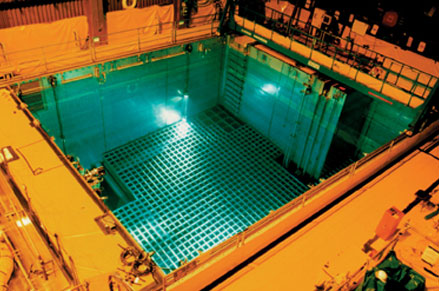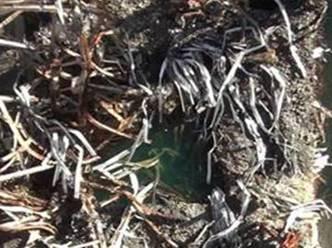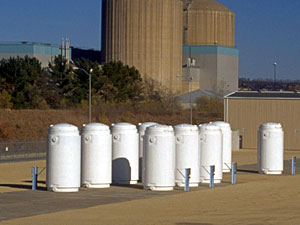
The Nuclear Regulatory Commission has again sided with the nuclear power industry (where have you heard that one before?) and rejected efforts by environmental/clean energy groups and five U.S. Senators to move high-level radioactive waste out of overcrowded, dangerous and poorly-protected fuel pools as soon as it is cool enough to be placed in dry casks.
Not only did the NRC Commissioners take this unconscionable vote, they said this was their last word on the subject and they would refuse to ever again consider the issue.
But the vote wasn’t unanimous: NRC Chair Allison Macfarlane, who has spent her career studying radioactive waste issues, issued a strong dissent to the decision, essentially arguing that the NRC staff hasn’t done its homework.
Which brings up an interesting subject we’ll talk about more below: what if the four Commissioners who voted for the industry on the waste issue–and nearly always vote for the industry–had been unsuccessful in their efforts in 2012 to oust then-chair Greg Jaczko, who almost certainly would have taken the same position as Macfarlane? We might then be looking at a Commission that could in a few months have had both Jaczko and Macfarlane as members, and perhaps at least one more Commissioner independent of the agency. That would be a very different situation than the industry-dominated and sympathetic Commission that has far too long run the NRC.

But first, back to the waste issue. The vote was on an ongoing NRC staff evaluation of the issue as part of its Fukushima lessons-learned program and an effort by 30+ organizations (including NIRS) seeking expedited transfer of fuel more than five years old–about the time it has cooled sufficiently to be put in dry casks–into dry cask storage within the next five years. The petition was based both on real-world experience at Fukushima–where there was great concern for a few days that the Unit-4 fuel pool had boiled dry (it hadn’t), and where the Unit-3 fuel pool was, and remains, in a near-demolished shape–as well as ongoing research that concludes the risk of catastrophic fuel pool accidents, especially in today’s mostly overcrowded pools, is far greater than the risk of dry cask accidents (although the clean energy community argues that the casks should be dispersed and “hardened” to protect against terrorism, natural disasters and the like).

In her dissent, Macfarlane castigated the staff for essentially shoddy research: “In my view, the staff has not adequately explored the issue of spent fuel management in the pool and as a result, I do not have adequate information on which to base a view on the need to require approaches that may lead to some form of expedited transfer of spent fuel from pools to dry casks.”
Macfarlane said she did not necessarily support a program to move the radioactive fuel to dry casks within five years, but primarily because the technical capacity to do so may not exist. And she complained that was the only option presented by the staff to the Commission:
“The only option before the Commission is continuing the analysis of requiring the rapid defueling of all spent fuel older than five years by 2019. First, even if there is a significant safety benefit to do so, it is not clear if it is physically possible to complete such a significant task within five years–given the current loading and handling infrastructure of individual U.S. power plants and the manufacturing capabilities of cask vendors. A study by Electric Power Research Institute on this topic, which the staff relied upon in their analysis, concluded the same and they examined transfer of fuel over longer 10-year and 15-year time frames.Second, when considering consequences beyond 50 miles and a more up-to-date conversion value of $4,000 per rem, the base cases for some reactor plants are actually cost beneficial. All “high cases,” which are meant to use more conservative assumptions to bound possible site-specific plant configurations, are cost-beneficial even assuming an aggressive five-year schedule. The staff considers the “high cases” to be overly conservative.
“The staff should further investigate the option of significantly reducing the overall cesium content in spent fuel pools, but over longer time frames, such as 10 years. This analysis may demonstrate a significant reduction in accident source terms for defense in depth, while requiring a lower number of additional dry storage casks. This approach may also be more feasible when using existing dry storage cask technologies to full capacity.”
In her nine-page dissent, the NRC chair also complained about the NRC staff’s failure unwillingness to fully engage the public in the agency’s radioactive waste discussions, writing, “I do not agree with the staff’s approach in engaging the public near the very end of the
current two-year regulatory review process, without the ability to fully provide input on key regulatory factors or review the draft regulatory analysis that was provided to the Commission. In accelerating this Tier 3 activity to align with the Waste Confidence environmental activities for public transparency, the staff may have ironically impeded the same public from fully vetting this issue in the safety and security arenas.”
Macfarlane concluded citing the precautionary principle:
“But as a precautionary principle, the Agency should continue to focus on enhancing defense-in-depth in a reasonable manner. Uncertainties in forecasting the next severe event (e.g., in the assumptions and judgments that go into modeling complex scenarios), as well as in other human factors, are difficult to quantify. The potential consequences would be intolerable to the surrounding human environment. These types of environmental impacts cannot be wholly measured and evaluated through frequency weighting of dose and quantified health objectives alone. We should holistically consider safety and security concerns and further evaluate potential defense-in-depth measures to compensate for these uncertainties. This regulatory approach can be pursued at a pace that is commensurate with the calculated risks that such events pose and in parallel with broader efforts to enhance our severe accident regulatory framework.”
In an important and too easily overlooked note, Macfarlane also stated that “The staff should not consider the EPA intermediate PAGs as an acceptable environmental policy metric, unless it is brought before the Commission as a policy matter.” Those intermediate PAGs (Protective Action Guidelines) greatly weaken radiation protection standards and will be the subject of more public comment this summer. NIRS will be providing our e-mail Alert list with comment information in a few weeks.

For their part, the five Senators who introduced legislation on this issue a couple of weeks ago reacted angrily to the NRC’s decision. Said Vermont Senator Bernie Sanders, “We are one natural disaster, mechanical failure or terrorist attack away from a disaster. The sooner we get the spent (fuel) out of the pools and into dry casks, the better, and if the NRC will not change the rules, I will continue to work with my colleagues to change the rules through legislation.”
Added Massachusetts Senator Ed Markey, “Overcrowded spent nuclear fuel pools are a disaster waiting to happen. Experts agree an accident at one of these pools could result in damage as bad as that caused by an accident at an operating nuclear reactor. Pilgrim Nuclear Plant’s spent fuel pool contains nearly four times more radioactive waste than it was originally designed to hold. It is time for the NRC to post the ‘Danger’ sign outside the fuel pools and begin to swiftly move spent fuel to safer storage now before a disaster occurs.”
Back to the composition of the NRC. If Greg Jaczko, who voted against licenses for the Vogtle and Summer reactors and since leaving the Commission has recommended phase-out of U.S. reactors, were still chair, Allison Macfarlane would almost certainly have still been President Obama’s next Democratic nominee (the NRC is required to have no more than three of its five members from the same political party). And there are two Democratic seats up this year: Commissioner Magwood is leaving the agency soon to head up Europe’s Nuclear Energy Agency, which exists not to regulate, but promote nuclear power (a position that raises the issue of whether it was a conflict-of-interest for Magwood to have taken this vote, and for that matter any other vote at this point) and Commissioner Apostolakis’ five-year term ends next month. He has not announced publicly whether he wants a second term, but the President is certainly under no obligation to re-appoint him even if he does.
We would have a very different Commission then. But we still could. Now, President Obama is in a position to act to fundamentally change the NRC and support his chosen chair. And, as this vote makes clear, to support his chosen NRC chair Macfarlane, he must use this opportunity to appoint such advocates to the NRC. Otherwise, he will be simply hanging her out to dry.
For that reason, NIRS has begun an e-mail campaign to urge the President to appoint such people to the Commission now. You can make your voice heard here. And NIRS and other groups will be making this point as forcefully as possible in other venues in the coming weeks as well.
Michael Mariotte
May 29, 2014
Permalink: http://nirs.org/2014/05/29/nrc-rejects-effort-to-move-radwaste-from-pools/
You can now support GreenWorld with your tax-deductible contribution on our new donation page here. PayPal now accepted. We gratefully appreciate every donation of any size–your support is what makes our work possible.
Comments are welcome on all GreenWorld posts! Say your piece above. Start a discussion. Don’t be shy; this blog is for you.
If you like GreenWorld, you can help us reach more people. Just use the icons below to “like” our posts and to share them on the various social networking sites you use. And if you don’t like GreenWorld, please let us know that too. Send an e-mail with your comments/complaints/compliments to nirs@nirs.org. Thank you!
Note: If you’d like to receive GreenWorld via e-mail daily, send your name and e-mail address to nirs@nirs.org and we’ll send you an invitation. Note that the invitation will come from a GreenWorld@wordpress.com address and not a nirs.org address, so watch for it.




Keeping ☢ fuel in pools will now be far more costly for ratepayers while at the same time, in essence just another long term money maker for the Nuclear Utilities that will run these sites with high security “forever”, at least for those living near them are concerned, thanks to the NRC Commissioners that have voted for this rip off, who have failed the publics trust again!
This is yet another broken promise from the Nuclear Industry (and the NRC) who vowed that they would return these Nuclear Power Plants to the public after the plants service life was reached!
Now more than ever before we must view nuclear power plants as slow motion nuclear incidents because once constructed, they will forever be a financial burden to all those ratepayers that had to fund them, which means that ratepayers are paying an unknown price for their energy since no one knows what the final costs will be…
MacFarlane quit on Tues. Oct. 21st: http://www.nrc.gov/reading-rm/doc-collections/news/2014/14-072.pdf Did she compose the letter?
Can you be nominated as new head Michael?
I assume she composed her own letter. Somehow I wouldn’t count on my being nominated–nor confirmed by the U.S. Senate….Michael
Putting an anti-nuclear activist in as head of the NRC would give balance. You are certainly one of the most experienced in nuclear.
There is also Tom Clements and one or two others who would make good candidates. For the letter was just thinking of how when people want to do a tell-all in their resignation letters they are told “not to burn their bridges” and sometimes the letters are even written for them. I don’t think she achieved what the letter said.